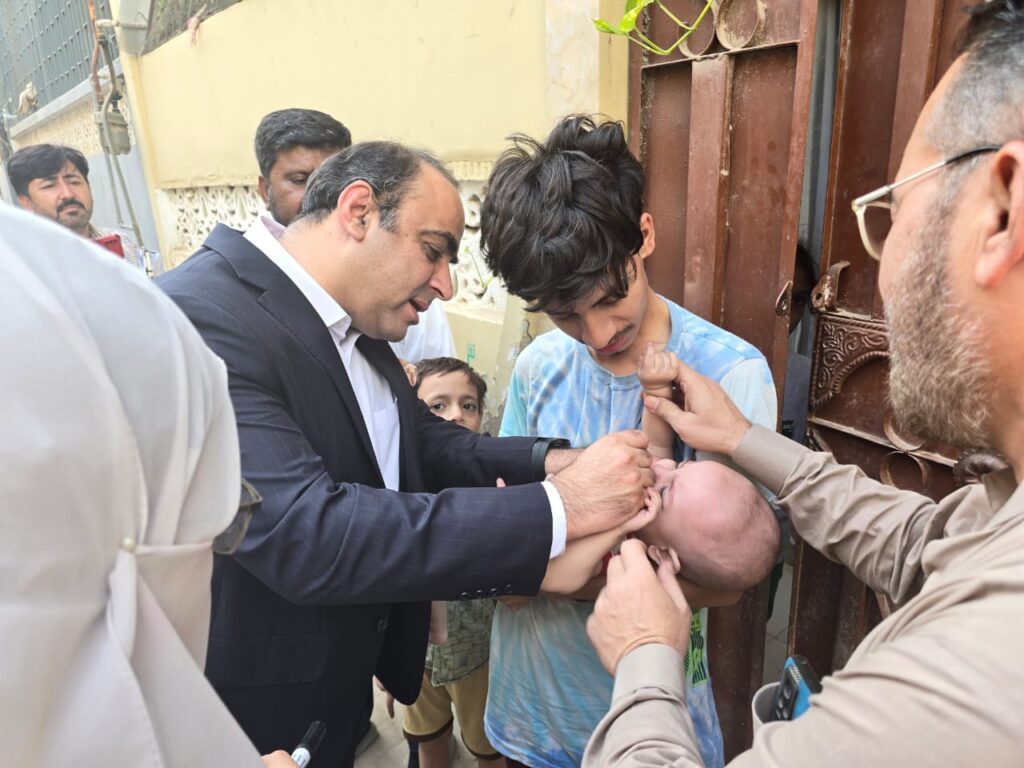By engaging directly with families, Masood Bhutto and his team aim to confront deeply ingrained misconceptions, urging community trust in the efficacy and safety of the polio vaccine

By our correspondent
KARACHI: In a determined effort to protect children against polio, Deputy Commissioner of Korangi District, Masood Bhutto, took a hands-on approach on Friday by personally administering polio drops to a child in Union Council Natha Khan, located in Shah Faisal Town, during the October National Immunization Days (NIDs) campaign. This gesture was not merely symbolic but part of a strategic push to reinforce the importance of vaccination in areas where vaccine refusal and misinformation pose significant barriers.
DC Masood Bhutto made a direct appeal to parents to support the anti-polio drive, underscoring that immunization is not only vital for their children’s immediate health but also fundamental to Pakistan’s long-term public health and societal stability. This visible commitment from Bhutto reflects a proactive stance by the Sindh government to combat polio, particularly in Karachi’s urban peripheries, which have been identified as high-risk zones due to a combination of population density, transient communities, and historical vaccine hesitancy.
By engaging directly with families, Masood Bhutto and his team aim to confront deeply ingrained misconceptions, urging community trust in the efficacy and safety of the polio vaccine. The Natha Khan visit is part of a broader mobilization across Karachi, with health workers and officials alike joining forces to make door-to-door visits, distribute informational leaflets, and offer consultations to clarify any questions parents might have about vaccination.

In Karachi, these efforts have historically been impeded by complex social dynamics, including distrust in healthcare initiatives and concerns about vaccine safety. However, the government has intensified its approach, using local influencers, religious leaders, and respected community figures to encourage participation in the immunization drive. This approach aligns with Pakistan’s commitment to eradicate polio, as evidenced by the extensive resources allocated to the campaign, from large-scale media outreach to grassroots mobilization.

Bhutto’s involvement highlights the collective responsibility shared by government bodies, healthcare workers, and families to ensure a polio-free future. His presence in high-risk neighborhoods sends a clear message: that the state is serious about eradicating polio and is willing to meet people where they are to build a healthier, safer Pakistan. Such initiatives are a crucial part of Pakistan’s strategy to meet its health targets and address public health challenges, with the hope that each small victory in local communities brings the country one step closer to eliminating polio entirely.

Meanwhile, Deputy Commissioner Korangi District, Masood Bhutto, visited underprivileged areas of Korangi District.
He met with residents, listened to their issues, administered polio drops to children, and gifted them biscuits. The DC mingled with the children, even lifting the young ones in his arms. The children’s joy was evident as they received the biscuits.



